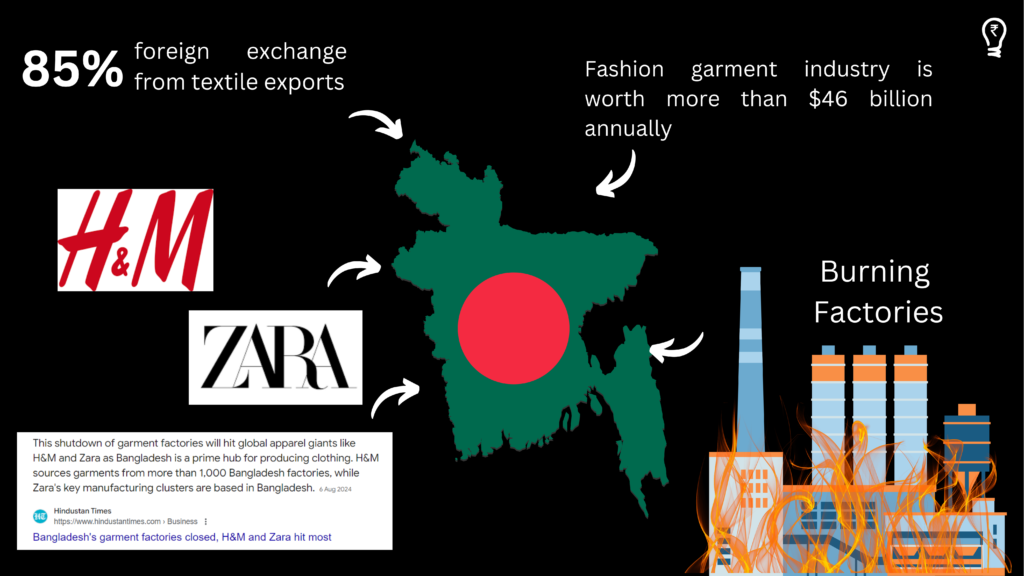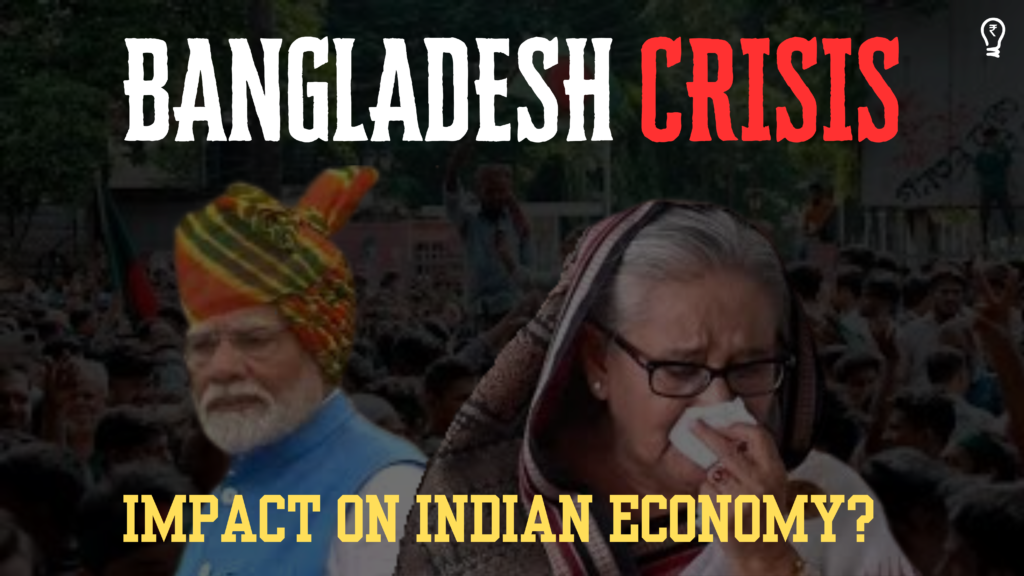Introduction:
At the moment, Bangladesh, one of the closest neighbors of India, is passing through a deeply critical political condition and must be viewed quite seriously as a threat to the economic stability of this nation. After serving on the government for 15 years, Prime Minister Sheikh Hasina has stepped down and now a temporary government with Nobel laureate Muhammad Yunus at its head, from the Bangladesh National Party (BNP) has taken over its place. This political turmoil, intensified by economic distress, unemployment, and social unrest, does not present an easy scenario for Bangladesh and definitely spells trouble for India, with strong socio-political and economic ties with the eastern neighbour.
For the last few years, political unrest has been simmering in Bangladesh. The 15 years of Sheikh Hasina’s rule were marked by pro-India foreign policy, two-way trade between the countries saw significant expansion, and Bangladesh became a global export powerhouse on the back of a booming textile industry. But this same period also saw growing internal crises: unemployment, an unavailability of prospects in the private sector, and, above all, a mounting sense of political disillusionment among the masses.
Problems in Bangladesh: Political Instability Leading to Economic Instability:
The political turmoil in Bangladesh has been building up over the past few years. Sheikh Hasina’s 15-year rule saw a pro-India foreign policy, a significant increase in trade between the two countries, and a booming textile industry that turned Bangladesh into a global export powerhouse. However, the same period has also witnessed a growing internal crisis: rising unemployment, lack of opportunities in the private sector, and an increasing sense of political disillusionment among the masses.
Key issues plaguing Bangladesh:
- Unemployment: Bangladesh has over 2 crore (20 million) unemployed people. Most of the literate population is finding no job apart from low-paid labor work, which creates a critical economic burden on the nation.
- Social unrest: In Bangladesh, yet another controversial verdict of the Bangladesh High Court compelling 30 percent job reservations has further inflamed social tensions. This particular decision so widely considered provocative by more sections of society led to violent protests and unrest, forcing Sheikh Hasina to leave the government.
- Bangladesh has lost much of its textile industry, that is essentially the core sector of its economy, due to political turmoil. Those were mostly relative-owned and politically affiliated factories of Hasina which were burnt in public protest.
This economic decline is closely intertwined with political instability as Bangladesh remains dependent on textile exports, which form 85% of foreign exchange. Any dislocation within the sector can lead to vast repercussions in Bangladesh. An unsure future at the political front, now dominated by a temporary government under BNP, has further unnerved the economy, damaging trades and ties with the world community, including India.
This political instability is closely tied to economic decline, as Bangladesh’s reliance on textile exports, which account for 85% of its foreign exchange, means that any disruption in this sector can have far-reaching consequences. The uncertain political future, now led by a temporary government under the BNP, has created further instability, affecting trade and international relations, particularly with India.
Political Impact: Shift in India-Bangladesh Relations:
The political crisis in Bangladesh has profound implications for its relations with India. Under Hasina’s government, India enjoyed a period of close cooperation, particularly in trade and security. The pro-India stance of the Hasina administration led to significant economic ties, with trade between the two countries growing steadily. India exported a variety of goods to Bangladesh, including raw materials for textiles, agriculture, and engineering goods.
However, the instability following Hasina’s departure threatens to upend this relationship:
- Pro-India policies may be reversed: Hasina’s government was notably pro-India, facilitating key trade agreements and border security cooperation. With the BNP in power, these policies could change, potentially affecting Indian investments and trade in Bangladesh.
- Economic impact of instability: Political unrest has already led to the destruction of major infrastructure, including factories and transport links. This could severely disrupt India’s trade with Bangladesh, as well as its access to the broader South Asian market.
- Uncertainty over new leadership: Nobel laureate Muhammad Yunus, who has temporarily taken the reins under the BNP, brings some hope of stability due to his global reputation. However, it remains to be seen whether he can steer Bangladesh through this crisis and maintain the strong ties with India that were nurtured under Hasina.
Economic Impact: Trade Disruptions and the Textile Industry Crisis:
India and Bangladesh have a robust economic relationship, with trade between the two countries reaching significant levels. However, Bangladesh’s political instability threatens to disrupt this economic partnership, particularly in sectors like textiles, agriculture, and engineering.
Imports from Bangladesh:
India imports around ₹15,000 crore worth of goods from Bangladesh annually, with more than half of these imports coming from the textile industry. Key imports from Bangladesh include:
- Textiles: India imports $600 million in readymade garments and $325 million in other textiles from Bangladesh.
- Agriculture: India imports $300 million worth of agricultural goods, including jute, tea, and fish, from Bangladesh.
- Engineering goods: $250 million worth of engineering products, such as machinery and industrial equipment, are imported annually.
- Leather: India imports $78 million in leather goods from Bangladesh.
The current political instability threatens these imports, particularly in the textile sector. Many of the factories that supply India with garments and other textile products have been destroyed during the ongoing unrest. If this continues, India may face disruptions in its textile supply chain, which could affect both domestic markets and Indian companies that rely on Bangladeshi textiles.
Exports to Bangladesh:
India exports around ₹90,000 crore ($11.1 billion) worth of goods to Bangladesh, making it one of India’s largest trade partners. Key exports include:
- Agricultural products: India exports $2.5 billion worth of agricultural goods to Bangladesh, including wheat, rice, and sugar.
- Textile raw materials: Bangladesh is India’s largest buyer of cotton, with India exporting $2 billion worth of raw materials for textiles annually.
- Engineering goods: India exports $2 billion worth of engineering products to Bangladesh, including machinery, vehicles, and electrical goods.
- Petrochemical products: India exports $1.25 billion worth of petrochemical goods, including refined petroleum and chemical products.
- Chemicals: India exports $1 billion worth of chemicals to Bangladesh.
Will Trade Continue?
Bangladesh’s economy is heavily reliant on its textile industry, which generates $46 billion annually, accounting for 85% of its foreign exchange. Brands like Zara, H&M, and Indian companies source textiles from Bangladesh due to its low production costs and duty-free trade policies. However, the destruction of factories and continued unrest could cripple Bangladesh’s textile industry, making it difficult for the country to maintain its trade relations with India.
Bangladesh has few alternatives to continuing trade with India, especially given its reliance on Indian cotton and other raw materials. However, the ability of Bangladesh to maintain its exports depends on how quickly the political situation stabilizes.

Impact on Government Projects:
The political instability in Bangladesh has led to the halting of several key cross-border infrastructure projects that are vital for regional connectivity. These projects include:
- Railway networks: Indian Railways and Bangladesh Railways intersect at five points, facilitating the movement of goods and passengers between the two countries. All these points have now been stopped due to the political unrest.
- Agartala-Akhaura Railway project: A major cross-border project designed to enhance trade and travel between India and Bangladesh, this project has now come to a halt.
- Multinational road and rail network: The network connecting India, Nepal, Bhutan, and Bangladesh has been stalled, affecting regional connectivity and trade.
- MV Ganga Vilas**: The world’s largest river cruise, set to travel over 3,200 km through 27 river systems across India and Bangladesh, has been stopped. This project was seen as a major boost to regional tourism and trade.
- India-Bangladesh Friendship Pipeline (IBFP): The high-speed diesel pipeline, with a capacity of 1 million metric tons per year, has been stopped. This pipeline was a key energy cooperation project between India and Bangladesh.
The halting of these projects affects not only India-Bangladesh relations but also regional trade and connectivity in South Asia. The suspension of the India-Bangladesh Friendship Pipeline, in particular, could lead to energy shortages in Bangladesh, further exacerbating its economic crisis.

Impact on Indian Private Companies:
Several Indian private companies that do business with Bangladesh are likely to be affected by the political instability:
- Adani Power: Adani Power supplies 1,500 megawatts of electricity to Bangladesh. Due to the political crisis, the Indian government has authorized Adani to redirect this electricity to India if Bangladesh fails to clear its dues. This could lead to energy shortages in Bangladesh.
- Numaligarh Refinery: Located in Assam, this refinery has been exporting petroleum products to Bangladesh since 2015. The ongoing crisis could disrupt these exports, affecting both the refinery’s business and Bangladesh’s access to petroleum products.
- Marico: Known for products like Set Wet Gel and Saffola, Marico exports 44% of its products to Bangladesh. The crisis could lead to a sharp decline in business for Marico in the region.
- Amul and Dabur: These Indian companies have a smaller presence in Bangladesh, with 1-5% of their business coming from the country. However, even this small percentage could be impacted by the ongoing unrest.
National Security Concerns:
Bangladesh’s political instability poses significant national security risks for India, particularly in the northeastern region.
Key security concerns include:
- Terrorism: Political unrest in Bangladesh could create a breeding ground for terrorist groups, particularly in India’s Northeast region, where cross-border insurgencies and terrorist activities have historically been a concern.
- Migration: The ongoing political and economic crisis in Bangladesh could lead to a spike in migration to India. Illegal migration from Bangladesh has long been a contentious issue in India’s northeastern states, and the current instability could exacerbate this problem.
- Focus on development and infrastructure: The instability in Bangladesh could divert both countries’ attention away from critical development projects and infrastructure initiatives in the region.
Conclusion:
Bangladesh’s political instability has already begun to affect its relationship with India in profound ways. The economic disruptions caused by the destruction of the textile industry and the halting of key cross-border projects are just the beginning. For India, Bangladesh’s crisis represents both a challenge and an opportunity. On the one hand, India risks losing a crucial trade partner and seeing increased security risks in its Northeast region. On the other hand, India could benefit from the instability by positioning itself as a stable alternative in the global textile supply chain.
The future of India-Bangladesh relations depends largely on how quickly Bangladesh can stabilize its political situation and revive its economy. For India, maintaining a strong diplomatic and economic relationship with Bangladesh will be essential to ensuring regional stability and security in the years to come.
Sources:
- https://www.google.com/search?q=what+percebbtage+of+textile+contributes+for+bangladesh&oq=what+percebbtage+of+textile+contributes+for+&gs_lcrp=EgZjaHJvbWUqCQgBECEYChigATIGCAAQRRg5MgkIARAhGAoYoAEyCQgCECEYChigATIJCAMQIRgKGKAB0gEIOTM0MWowajmoAgCwAgE&sourceid=chrome&ie=UTF-8
- https://www.google.com/search?q=does+zara+and+h%26m+buy+from+bangladesh&oq=does+zara+and+h%26m+buy+from+&gs_lcrp=EgZjaHJvbWUqBwgBECEYoAEyBggAEEUYOTIHCAEQIRigATIHCAIQIRigATIHCAMQIRigATIHCAQQIRigAdIBCDg5OTlqMGo5qAIAsAIB&sourceid=chrome&ie=UTF-8
- https://www.thehindu.com/news/national/turmoil-in-bangladesh-delays-agartala-akhaura-line-connectivity-project-further/article68493141.ece
- https://m.economictimes.com/markets/stocks/news/marico-shares-fall-over-4-as-bangladesh-business-may-get-hit/articleshow/112306741.cms#:~:text=From%2051%25%20in%20FY22%2C%20the,resilient%20and%20sustained%20its%20momentum.

Sarthak Goel
Vice-President
Deepseek: A journey from Hedge Funds to AI
Introduction: In this busy and bustling day to day life of ours managing our Finances…
Beyond Numbers: The Human Cost of Infosys’ Layoffs and the Global Normalization of Workforce Reduction
A Familiar Script: Infosys and the Corporate Playbook of Disposable Labor: On February 7, 2025,…
Understanding Tariffs and Their Impact on India
What Are Tariffs? Tariffs are taxes governments levy on foreign imports to make the goods more…
The Economics of Player Transfers in Football
Introduction: In the world of football player transfers are more than just transactions, they are…
Session 5
Session 5- Unraveling Equity Derivatives: Insights from the Fifth Development Session The Fifth Development Session…
An Attempt To Deteriorate The Creditworthiness of Indian Entities
Introduction: The growth story of India in almost every sector is not alien to the…









Leave a Comment